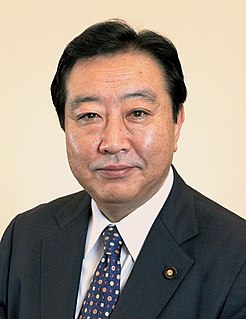A Quote by Shinzo Abe
To protect people's lives and keep our children safe, we must implement public-works spending and do so proudly. If possible, I'd like to see the Bank of Japan purchase all of the construction bonds that we need to issue to cover the cost. That would also forcefully circulate money in the market. That would be positive for the economy, too.
Related Quotes
Young children need to develop good habits that will be useful to them the rest of their lives. It is important to keep the lessons age-appropriate. For example, when your children start earning allowances, that would be a good time to teach them how to put some money in the bank instead of spending it all.
There's no denying that a collapse in stock prices today would pose serious macroeconomic challenges for the United States. Consumer spending would slow, and the U.S. economy would become less of a magnet for foreign investors. Economic growth, which in any case has recently been at unsustainable levels, would decline somewhat. History proves, however, that a smart central bank can protect the economy and the financial sector from the nastier side effects of a stock market collapse.
We are a great capitalist society, that works most of the time. We do need to take better care of our people and fix the access, cost, and quality of healthcare. But we need to act intelligently. We needed the intervention of government to keep the economy from falling into an abyss, but we must now encourage the creation of business - not burden it.
We have so many issues today that we need to confront. Comprehensive immigration reform. We have to solve the issue of poverty, the issue of hunger, the issue of war - spending billions of dollars to kill rather than to build. We have to deal with the fact that all of our children should be receiving the best possible education.
According to the Bank of England the economy is growing too fast so interest rates must rise to counter the supposed inflationary threat. In lay terms, I interpret this to mean that people are working much harder, causing economic growth, and they're in danger of spending their money, which is what the recession-hit shops want them to do. But the Bank and the City seem to think this is wrong, and that if people work harder they should be punished by having their mortgages increased.
In all humility and sincerity we must admit a power higher than ourselves from whom is derived a positive moral code that will give our lives significance and purpose. We also must remember once and for all that honesty, respect, and honor as such are not for sale on the market block. They are ingredients that you and I and all people should put into our daily lives.
It is eminently possible to have a market-based economy that requires no such brutality and demands no such ideological purity. A free market in consumer products can coexist with free public health care, with public schools, with a large segment of the economy -- like a national oil company -- held in state hands. It's equally possible to require corporations to pay decent wages, to respect the right of workers to form unions, and for governments to tax and redistribute wealth so that the sharp inequalities that mark the corporatist state are reduced. Markets need not be fundamentalist.
There are the fundamental core values of the Democratic Party, which is to work to grow the economy, to create jobs, to encourage small business, to encourage ownership, to expand access to quality health care, to enhance opportunity by making higher education more affordable to American's young people, to have our children live in safe neighborhoods, drug-free, crime-free, and a safe and clean environment, first and foremost to provide for the national defense, to protect and defend the American people, and to have accountability for our budget and for our spending.
Each of us spends money on things that we do not really need. You could take the money you're spending on those unnecessary things and give it to this organization the Against Malaria Foundation which would take the money you had given and use it to buy nets to protect children. And we know reliably that if we provide nets, they're used, and they reduce the number of children dying from malaria. Fortunately more and more people are understanding this idea, and the result is a growing movement effective altruism.
The sluggish economy is creating a situation where the young people in Japan cannot cherish their desires or have prospects for their future. Also, the decline in Japan's economic capability is resulting in a declining presence for Japan's foreign policy as well.
Accordingly, the duties and mission that I must fulfill are pretty clear: namely, to regain a strong and robust economy, and also to restore Japan's strong foreign policy capability.
We also must pull from our highest ideals of justice and protect against those ills that destabilized our economy - like predatory lending, over-leveraged financial institutions and the unchecked avarice of the past that trumped fairness and common sense. Our platform calls for significant cuts in federal spending.
The underlying strategy of the Fed is to tell people, "Do you want your money to lose value in the bank, or do you want to put it in the stock market?" They're trying to push money into the stock market, into hedge funds, to temporarily bid up prices. Then, all of a sudden, the Fed can raise interest rates, let the stock market prices collapse and the people will lose even more in the stock market than they would have by the negative interest rates in the bank. So it's a pro-Wall Street financial engineering gimmick.











































